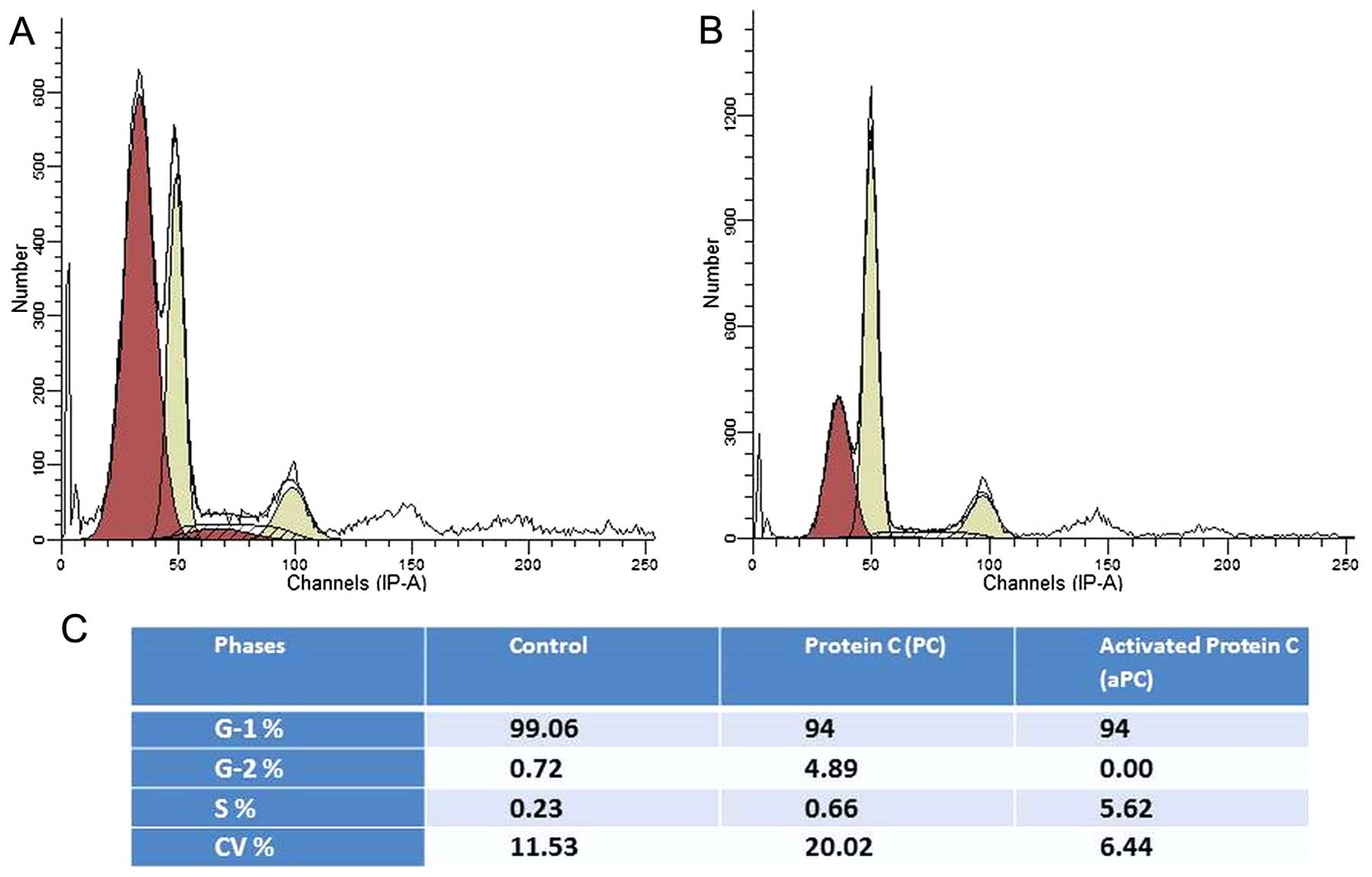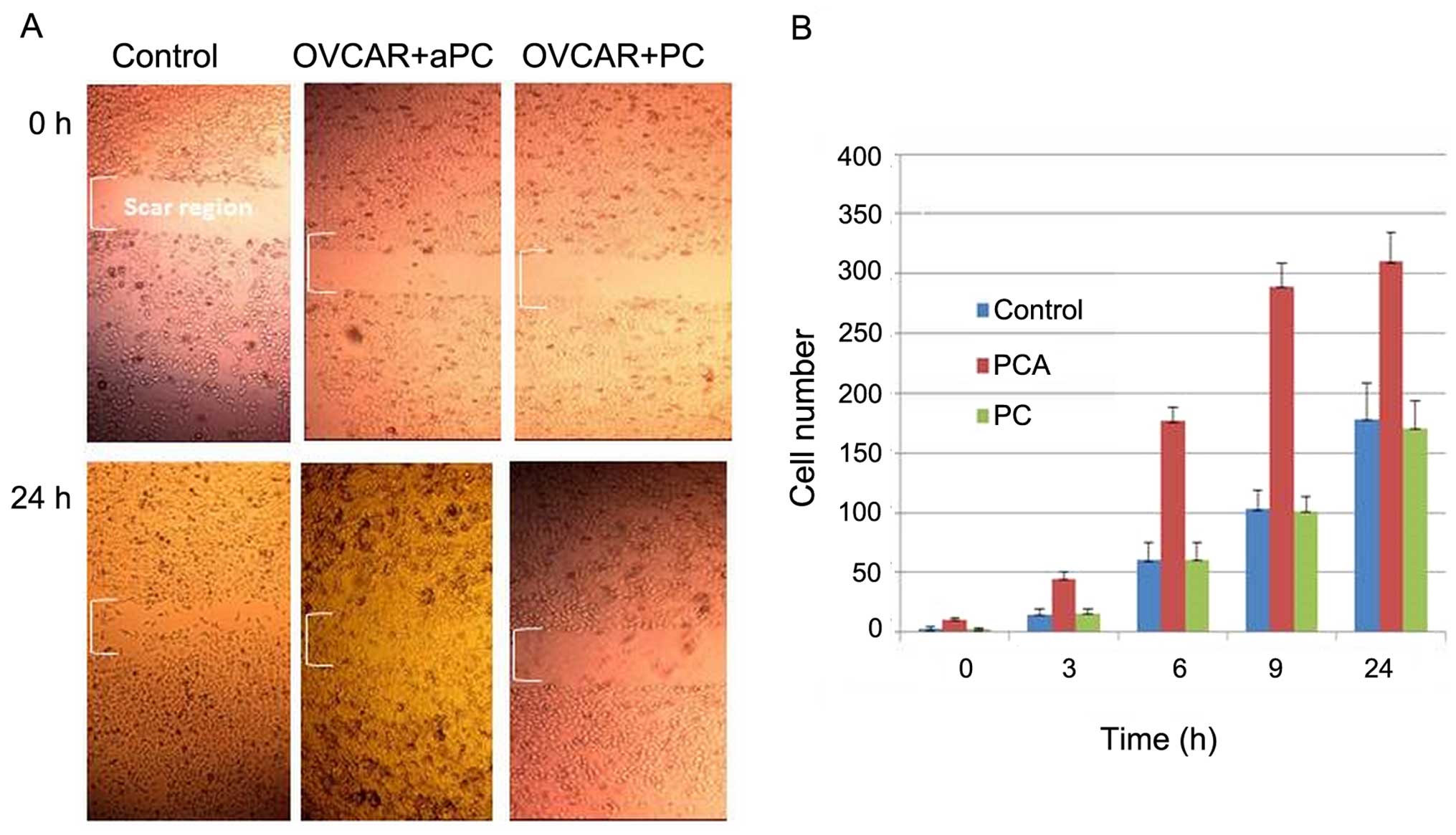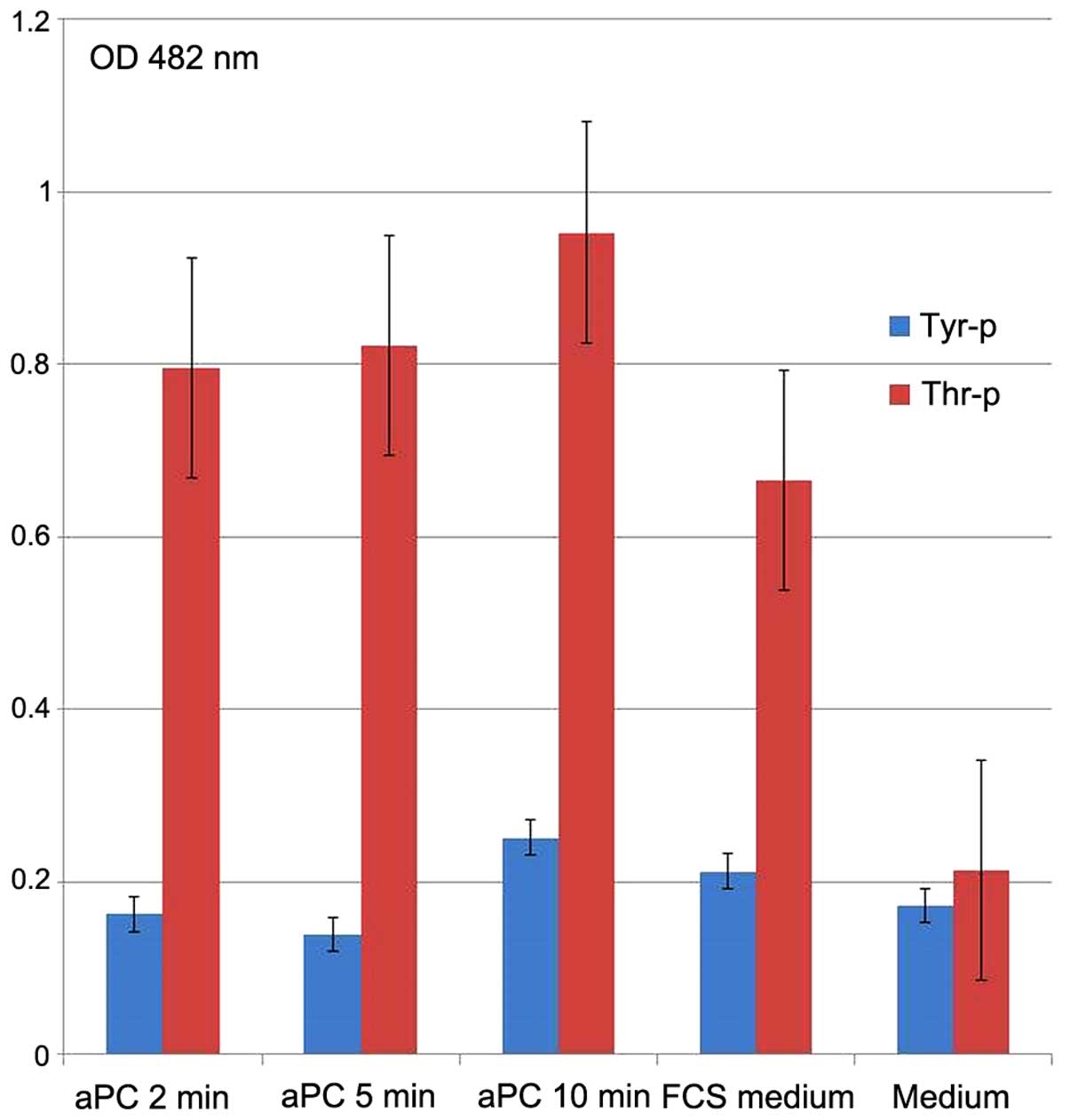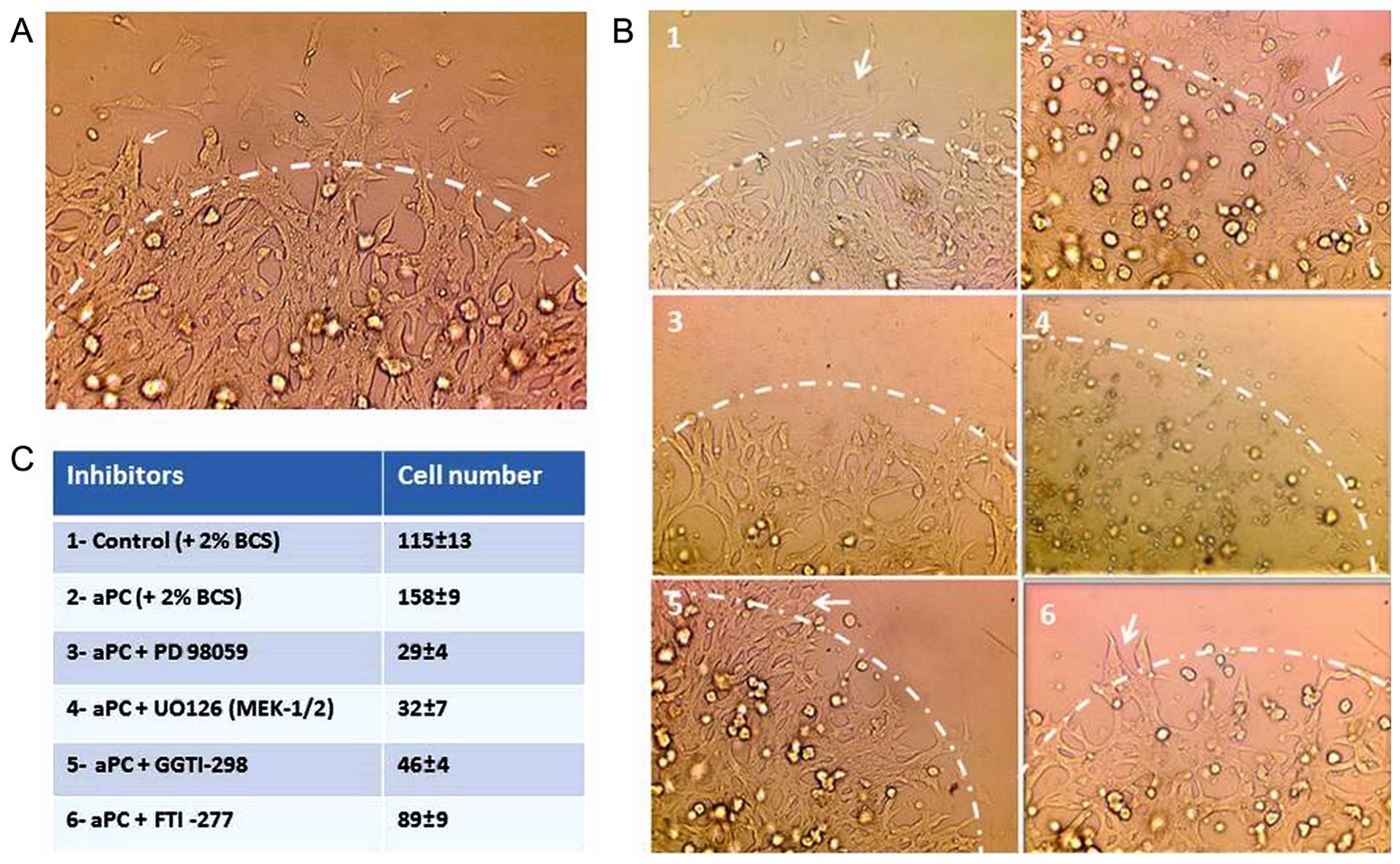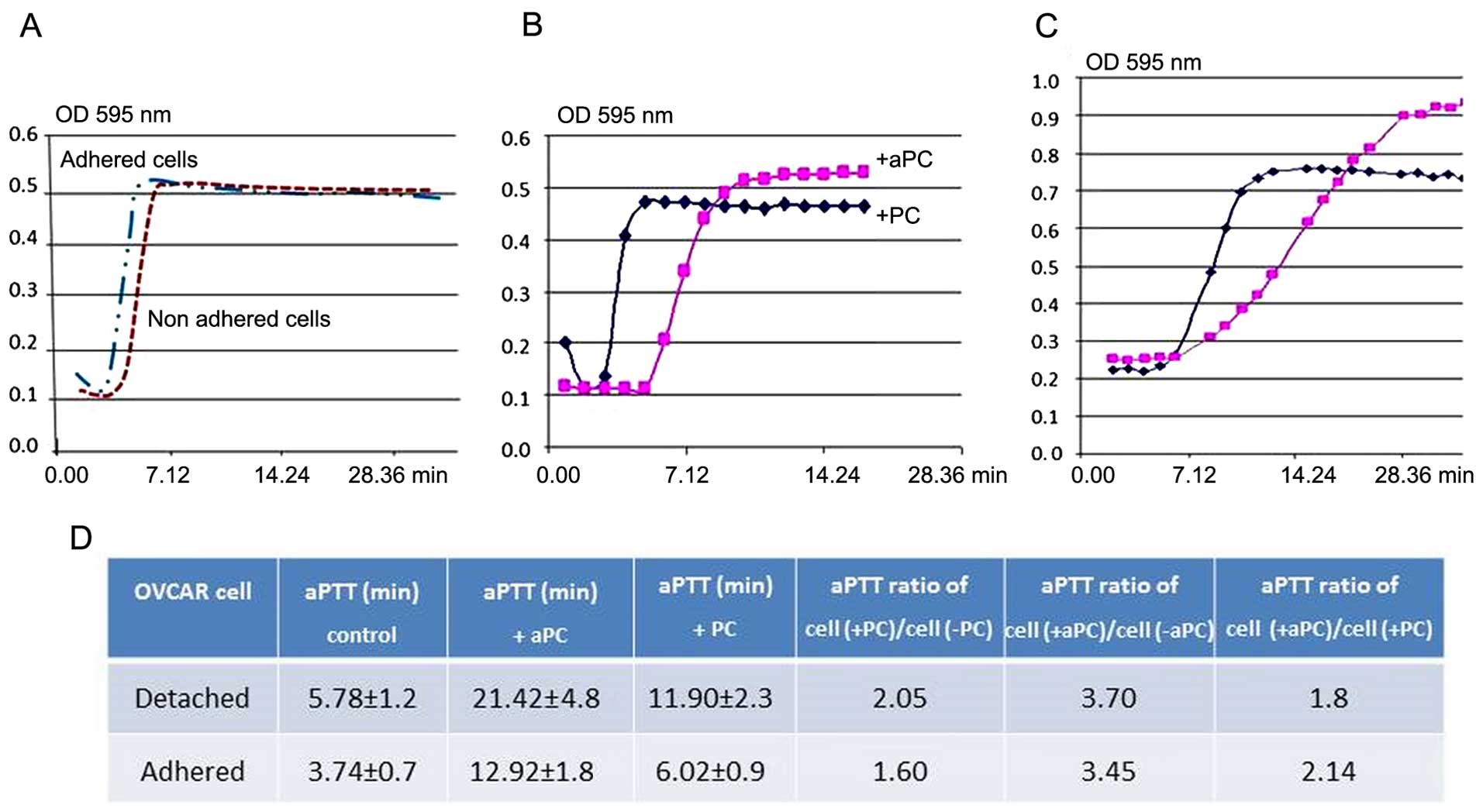|
1
|
Matte I, Lane D, Laplante C, Rancourt C
and Piché A: Profiling of cytokines in human epithelial ovarian
cancer ascites. Am J Cancer Res. 2:566–580. 2012.PubMed/NCBI
|
|
2
|
Desjardins M, Xie J, Gurler H, Muralidhar
GG, Sacks JD, Burdette JE and Barbolina MV: Versican regulates
metastasis of epithelial ovarian carcinoma cells and spheroids. J
Ovarian Res. 7:702014. View Article : Google Scholar : PubMed/NCBI
|
|
3
|
Goncharenko-Khaider N, Matte I, Lane D,
Rancourt C and Piché A: Ovarian cancer ascites increase Mcl-1
expression in tumor cells through ERK1/2-Elk-1 signaling to
attenuate TRAIL-induced apoptosis. Mol Cancer. 11:842012.
View Article : Google Scholar : PubMed/NCBI
|
|
4
|
Puiffe ML, Le Page C, Filali-Mouhim A,
Zietarska M, Ouellet V, Tonin PN, Chevrette M, Provencher DM and
Mes-Masson AM: Characterization of ovarian cancer ascites on cell
invasion, proliferation, spheroid formation, and gene expression in
an in vitro model of epithelial ovarian cancer. Neoplasia.
9:820–829. 2007. View Article : Google Scholar : PubMed/NCBI
|
|
5
|
Wang L, Madigan MC, Chen H, Liu F,
Patterson KI, Beretov J, O'Brien PM and Li Y: Expression of
urokinase plasminogen activator and its receptor in advanced
epithelial ovarian cancer patients. Gynecol Oncol. 114:265–272.
2009. View Article : Google Scholar : PubMed/NCBI
|
|
6
|
Fukudome K, Ye X, Tsuneyoshi N, Tokunaga
O, Sugawara K, Mizokami H and Kimoto M: Activation mechanism of
anticoagulant protein C in large blood vessels involving the
endothelial cell protein C receptor. J Exp Med. 187:1029–1035.
1998. View Article : Google Scholar : PubMed/NCBI
|
|
7
|
Dahlbäck B and Villoutreix BO: Molecular
recognition in the protein C anticoagulant pathway. J Thromb
Haemost. 1:1525–1534. 2003. View Article : Google Scholar : PubMed/NCBI
|
|
8
|
Fukudome K and Esmon CT: Identification,
cloning, and regulation of a novel endothelial cell protein
C/activated protein C receptor. J Biol Chem. 269:26486–26491.
1994.PubMed/NCBI
|
|
9
|
Taylor FB Jr, Peer GT, Lockhart MS,
Ferrell G and Esmon CT: Endothelial cell protein C receptor plays
an important role in protein C activation in vivo. Blood.
97:1685–1688. 2001. View Article : Google Scholar : PubMed/NCBI
|
|
10
|
Li W, Zheng X, Gu J, Hunter J, Ferrell GL,
Lupu F, Esmon NL and Esmon CT: Overexpressing endothelial cell
protein C receptor alters the hemostatic balance and protects mice
from endotoxin. J Thromb Haemost. 3:1351–1359. 2005. View Article : Google Scholar : PubMed/NCBI
|
|
11
|
Zheng X, Li W, Gu JM, Qu D, Ferrell GL,
Esmon NL and Esmon CT: Effects of membrane and soluble EPCR on the
hemostatic balance and endotoxemia in mice. Blood. 109:1003–1009.
2007. View Article : Google Scholar
|
|
12
|
Griffin JH, Zlokovic BV and Mosnier LO:
Protein C anticoagulant and cytoprotective pathways. Int J Hematol.
95:333–345. 2012. View Article : Google Scholar : PubMed/NCBI
|
|
13
|
Van Sluis GL, Niers TM, Esmon CT,
Tigchelaar W, Richel DJ, Buller HR, Van Noorden CJ and Spek CA:
Endogenous activated protein C limits cancer cell extravasation
through sphin-gosine-1-phosphate receptor 1-mediated vascular
endothelial barrier enhancement. Blood. 114:1968–1973. 2009.
View Article : Google Scholar : PubMed/NCBI
|
|
14
|
Azzazene D, Al Thawadi H, Al Farsi H,
Besbes S, Geyl C, Mirshahi S, Pardo J, Faussat AM, Jeannette S,
Therwath A, Pujade-Lauraine E and Mirshahi M: Plasma endothelial
protein C receptor influences innate immune response in ovarian
cancer by decreasing the population of natural killer and TH17
helper cells. Int J Oncol. 43:1011–1018. 2013.PubMed/NCBI
|
|
15
|
Van Sluis GL, Brüggemann LW, Esmon CT,
Kamphuisen PW, Richel DJ, Büller HR, Van Noorden CJ and Spek CA:
Endogenous activated protein C is essential for immune-mediated
cancer cell elimination from the circulation. Cancer Lett.
306:106–110. 2011. View Article : Google Scholar : PubMed/NCBI
|
|
16
|
Laszik Z, Mitro A, Taylor FB Jr, Ferrell G
and Esmon CT: Human protein C receptor is present primarily on
endothelium of large blood vessels: implications for the control of
the protein C pathway. Circulation. 96:3633–2640. 1997. View Article : Google Scholar : PubMed/NCBI
|
|
17
|
Balazs AB, Fabian AJ, Esmon CT and
Mulligan RC: Endothelial protein C receptor (CD201) explicitly
identifies hematopoietic stem cells in murine bone marrow. Blood.
107:2317–2321. 2006. View Article : Google Scholar
|
|
18
|
Schaffner F, Yokota N, Carneiro-Lobo T,
Kitano M, Schaffer M, Anderson GM, Mueller BM, Esmon CT and Ruf W:
Endothelial protein C receptor function in murine and human breast
cancer development. PLoS One. 8:e610712013. View Article : Google Scholar : PubMed/NCBI
|
|
19
|
Fukudome K, Kurosawa S, Stearns-Kurosawa
DJ, He X, Rezaie AR and Esmon CT: The endothelial cell protein C
receptor. Cell surface expression and direct ligand binding by the
soluble receptor. J Biol Chem. 271:17491–17498. 1996. View Article : Google Scholar : PubMed/NCBI
|
|
20
|
Saposnik B, Lesteven E, Lokajczyk A, Esmon
CT, Aiach M and Gandrille S: Alternative mRNA is favored by the A3
haplotype of the EPCR gene PROCRand generates a novel soluble form
of EPCR in plasma. Blood. 111:3442–3451. 2008. View Article : Google Scholar :
|
|
21
|
Nayak RC, Sen P, Ghosh S, Gopalakrishnan
R, Esmon CT, Pendurthi UR and Rao LV: Endothelial cell protein C
receptor cellular localization and trafficking: potential
functional implications. Blood. 114:1974–1986. 2009. View Article : Google Scholar : PubMed/NCBI
|
|
22
|
Schuepbach RA and Riewald M: Coagulation
factor Xa cleaves protease-activated receptor-1 and mediates
signaling dependent on binding to the endothelial protein C
receptor. J Thromb Haemost. 8:379–388. 2010. View Article : Google Scholar
|
|
23
|
Joyce DE, Gelbert L, Ciaccia A, DeHoff B
and Grinnell BW: Gene expression profile of antithrombotic protein
C defines new mechanisms modulating inflammation and apoptosis. J
Biol Chem. 276:11199–11203. 2001. View Article : Google Scholar : PubMed/NCBI
|
|
24
|
Riewald M, Petrovan RJ, Donner A, Mueller
BM and Ruf W: Activation of endothelial cell protease activated
receptor 1 by the protein C pathway. Science. 296:1880–1882. 2002.
View Article : Google Scholar : PubMed/NCBI
|
|
25
|
Ducros E, Mirshahi S, Azzazene D,
Camilleri-Broët S, Mery E, Al Farsi H, Althawadi H, Besbess S,
Chidiac J, Pujade-Lauraine E, et al: Endothelial protein C receptor
expressed by ovarian cancer cells as a possible biomarker of cancer
onset. Int J Oncol. 41:433–440. 2012.PubMed/NCBI
|
|
26
|
Ducros E, Mirshahi SS, Faussat AM,
Mirshahi P, Dimicoli S, Tang R, Pardo J, Ibrahim J, Marie JP,
Therwath A, et al: Soluble endothelial protein C receptor (sEPCR)
is likely a biomarker of cancer-associated hypercoagulability in
human hematologic malignancies. Cancer Med. 1:261–267. 2012.
View Article : Google Scholar
|
|
27
|
Berthaut A, Mirshahi P, Benabbou N,
Azzazene D, Bordu C, Therwath A, Legeais JM and Mirshahi M:
Vascular endothelial growth factor receptor-1 (VEGFR-1) expression
in human corneal fibroblast decreased with age. Mol Vis.
15:1997–2007. 2009.PubMed/NCBI
|
|
28
|
Queille S, Drougard C, Sarasin A and
Daya-Grosjean L: Effects of XPD mutations on ultraviolet-induced
apoptosis in relation to skin cancer-proneness in repair-deficient
syndromes. J Invest Dermatol. 117:1162–1170. 2001. View Article : Google Scholar : PubMed/NCBI
|
|
29
|
Ducros E, Berthaut A, Mirshahi SS, Faussat
AM, Soria J, Agarwal MK and Mirshahi M: Aldosterone modifies
hemostasis via upregulation of the protein-C receptor in human
vascular endothelium. Biochem Biophys Res Commun. 373:192–196.
2008. View Article : Google Scholar : PubMed/NCBI
|
|
30
|
Mirshahi S, Soria C, Kouchakji B, Kierzek
G, Borg JY, Varin R, Chidiac J, Drouet L, Mirshahi M and Soria J:
New combinational assay using soluble fibrin and D-dimer
determinations: a promising strategy for identifying patients with
suspected venous thromboembolism. PLoS One. 9:e923792014.
View Article : Google Scholar : PubMed/NCBI
|
|
31
|
Ayantunde AA and Parsons SL: Pattern and
prognostic factors in patients with malignant ascites: a
retrospective study. Ann Oncol. 18:945–949. 2006. View Article : Google Scholar
|
|
32
|
Smolle E, Taucher V and Haybaeck J:
Malignant ascites in ovarian cancer and the role of targeted
therapeutics. Anticancer Res. 34:1553–1561. 2014.PubMed/NCBI
|
|
33
|
Casslén B, Bossmar T, Lecander I and
Astedt B: Plasminogen activators and plasminogen activator
inhibitors in blood and tumour fluids of patients with ovarian
cancer. Eur J Cancer. 30A:1302–1309. 1994. View Article : Google Scholar : PubMed/NCBI
|
|
34
|
Graves LE, Ariztia EV, Navari JR, Matzel
HJ, Stack MS and Fishman DA: Proinvasive properties of ovarian
cancer ascites-derived membrane vesicles. Cancer Res. 64:7045–7049.
2004. View Article : Google Scholar : PubMed/NCBI
|
|
35
|
Xue M, Thompson P, Kelso I and Jackson C:
Activated protein C stimulates proliferation, migration and wound
closure, inhibits apoptosis and upregulates MMP-2 activity in
cultured human keratinocytes. Exp Cell Res. 299:119–127. 2004.
View Article : Google Scholar : PubMed/NCBI
|
|
36
|
Van Hinsbergh VW, Bertina RM, Van
wijngaarden A, Van Tilburg NH, Emeis JJ and Haverkate F: Activated
protein C decreases plasminogen activator-inhibitor activity in
endothelial cell-conditioned medium. Blood. 65:444–451.
1985.PubMed/NCBI
|
|
37
|
Mosnier LO, Zlokovic BV and Griffin JH:
The cytoprotective protein C pathway. Blood. 109:3161–3172. 2007.
View Article : Google Scholar
|
|
38
|
Mohan Rao LV, Esmon CT and Pendurthi UR:
Endothelial cell protein C receptor: a multiliganded and
multifunctional receptor. Blood. 124:1553–1562. 2014. View Article : Google Scholar : PubMed/NCBI
|















